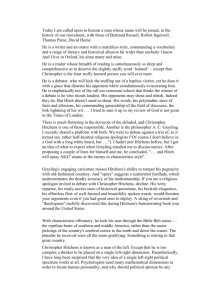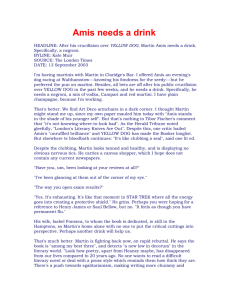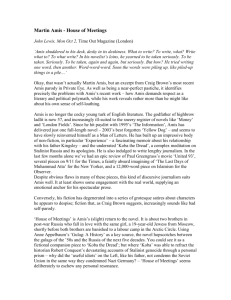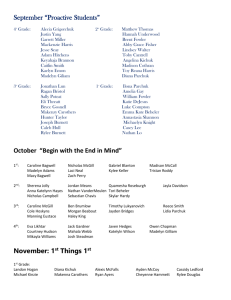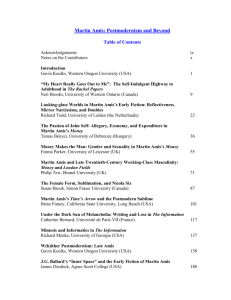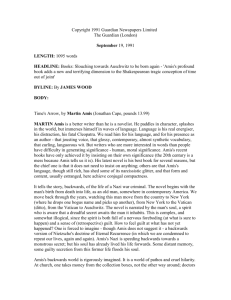jager_summary
advertisement
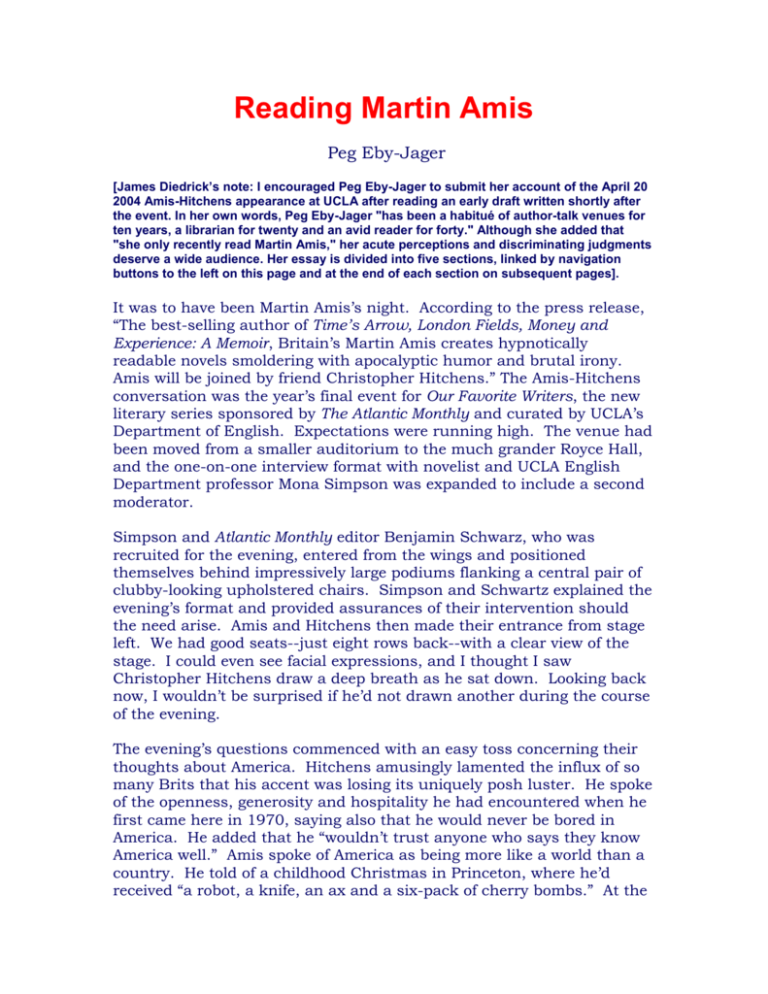
Reading Martin Amis Peg Eby-Jager [James Diedrick’s note: I encouraged Peg Eby-Jager to submit her account of the April 20 2004 Amis-Hitchens appearance at UCLA after reading an early draft written shortly after the event. In her own words, Peg Eby-Jager "has been a habitué of author-talk venues for ten years, a librarian for twenty and an avid reader for forty." Although she added that "she only recently read Martin Amis," her acute perceptions and discriminating judgments deserve a wide audience. Her essay is divided into five sections, linked by navigation buttons to the left on this page and at the end of each section on subsequent pages]. It was to have been Martin Amis’s night. According to the press release, “The best-selling author of Time’s Arrow, London Fields, Money and Experience: A Memoir, Britain’s Martin Amis creates hypnotically readable novels smoldering with apocalyptic humor and brutal irony. Amis will be joined by friend Christopher Hitchens.” The Amis-Hitchens conversation was the year’s final event for Our Favorite Writers, the new literary series sponsored by The Atlantic Monthly and curated by UCLA’s Department of English. Expectations were running high. The venue had been moved from a smaller auditorium to the much grander Royce Hall, and the one-on-one interview format with novelist and UCLA English Department professor Mona Simpson was expanded to include a second moderator. Simpson and Atlantic Monthly editor Benjamin Schwarz, who was recruited for the evening, entered from the wings and positioned themselves behind impressively large podiums flanking a central pair of clubby-looking upholstered chairs. Simpson and Schwartz explained the evening’s format and provided assurances of their intervention should the need arise. Amis and Hitchens then made their entrance from stage left. We had good seats--just eight rows back--with a clear view of the stage. I could even see facial expressions, and I thought I saw Christopher Hitchens draw a deep breath as he sat down. Looking back now, I wouldn’t be surprised if he’d not drawn another during the course of the evening. The evening’s questions commenced with an easy toss concerning their thoughts about America. Hitchens amusingly lamented the influx of so many Brits that his accent was losing its uniquely posh luster. He spoke of the openness, generosity and hospitality he had encountered when he first came here in 1970, saying also that he would never be bored in America. He added that he “wouldn’t trust anyone who says they know America well.” Amis spoke of America as being more like a world than a country. He told of a childhood Christmas in Princeton, where he’d received “a robot, a knife, an ax and a six-pack of cherry bombs.” At the age of nine, little Martin Amis must have truly felt he was living in the land of opportunity. Both authors have found much to admire in America, and it was gratifying to listen as compliments were tossed back and forth. Hitchens pointed out that America is a nation “founded on documents”--high praise indeed from such a prolific writer--and that among those documents, the Constitution, he assured us, “is godless.” Amis spoke of a desire to end his days as an American writer, claiming that “colonials healthily mongrelized British fiction.” Hitchens rhetorically asked which country got the better deal in Auden and T.S. Eliot’s trading national identities. Hitchens claimed that he left Britain, a country that has “traditions, not rights,” to escape Margaret Thatcher and Princess Di. Amis said that he sees America as the center of the writers’ world, while England “leads the world in decline.” Jaundiced outlook and curdled opinion settled in around the time that Amis and Hitchens agreed “America is the last hope.” Hitchens & Bellow It seems to me that the story of Hitchens’ introduction to Saul Bellow set in motion the “Christopher Hitchens Show” that came to dominate the evening. Hitchens had mildly agitated for this story, in which he played the lead, to be told. “No sinister balls!” Amis reportedly demanded of Hitchens in the car on their way to Bellow’s home. “Distressing, hardnosed, left-wing blues,” explained Amis, was their shared definition of “sinister balls.” But it was to be a balls-out night for Hitchens, who, shortly after arriving, picked a fight with his friend’s literary mentor over Edward Said--at the time Bellow’s favored bete noire. Hitchens now commandeered the evening with Our Favorite Writers just as he had done with Amis’s evening with his favorite writer so many years before. Hitchens grew animated as he moved through a rendition of his tangle with Bellow. He told how Amis had kicked his shin repeatedly under the table to get him to relent--more than either of his two wives had ever done. “Bellow likes to fight and so do I,” was the slim explanation that Hitchens had offered Amis the next morning. This story was humorously told, and it drew a good laugh. At this point, the audience was still rooting for both Amis and Hitchens--wanting them to open up. A discussion of the literary major league and what happens when titans clash might have opened on to any of a number of ideas that the audience was keen to hear about. But it didn’t. It simply thrust Christopher Hitchens into the limelight. Martin Amis never had a chance, as I now see it. Christopher Hitchens is a linguistic berserker--among other things--whirling about in the front line of battle, a cigarette in one hand and a drink in the other, as he indiscriminately shreds the opposition with his pick-ax intellect and his broadsword tongue. Hitchens’ rants, delivered in a whirl of words with an unflinching moral certainty, consumed a good deal of the evening, and Amis certainly must have known that resistance was futile. Hitchens & Bush On the question of the war in Iraq, Hitchens insisted that it was absolutely the right thing to do and absolutely the right time to do it. Then, somehow, he segued into what has to be the silliest defense of George W. Bush ever cobbled together. It went something like this: Laura Bush told the then-hard-drinking George W. that it was either Jim Beam or her. George W., in opting for her, was not really embracing the strident Christianity that many believe to be at the root of his decisionmaking and that Hitchens so vehemently opposes. He was simply doing what needed to be done to keep Laura. Besides, we now have “the nicest woman in the White House” that we’ve ever had. Such was the zigging and zagging of Hitchens’ rationalizing, leaving me to wonder at the strange political bedfellows with whom Hitchens is presently locked in embrace as he advocates the destruction of tyrants and terrorists. Hitchens & Religion Hitchens’ accept-my-word-as-truth attitude peaked on the subject of Mel Gibson’s The Passion. He referred to it as the “Leni Riefenstahl version” and decreed it to be “an anti-Semitic film made by an anti-Semite who is the son of an anti-Semite.” “Jesus is not a historical figure,” Hitchens unequivocally stated. For emphasis, he added that although Mohammed is a historical figure, Jesus is not. A professor of medieval literature who is also a biblical scholar found this claim to be absolutely preposterous, citing two “undoubtedly authentic” references in the writings of a, a firstcentury historian, who provided independent confirmation as to the existence of Jesus (Josephus, Jewish Antiquities). Amis and Hitchens revealed their sole parting of the way over Gibson’s movie. Amis liked it and felt it to be a powerful film about a powerful myth, and when he said that Hitchens was being too much of a literalist on the topic, Hitchens abruptly countered with “you can’t move between myth and reality so quickly.” Amis simply shrugged--almost imperceptibly--and the matter was dropped, forgoing the need for a moderator’s intervention and avoiding any discussion as to why one could not move quickly between myth and reality. Building on The Passion and Jesus, Hitchens then launched a full-scale attack on religion. He unequivocally informed the audience that religion equals totalitarianism; that religion is simply a “Disneyfied fraud,” a denial of responsibility and a slavery of the mind. There is absolutely no excuse for being religious, and the human race simply must “outgrow the collective human yearning for God to exist.” “How long will it take us,” he demanded, to get away from “peasant religious belief?” We must “dump the priests, rabbis and mullahs.” Little evidence and no explanation were offered, and it had begun to feel as though Christopher Hitchens was demanding that we take everything he said “on faith.” If there were any lingering uncertainties as to Hitchens’ ability to formulate a moderate opinion, those were likely dispelled when he tapdanced through his “Mother Theresa is a Slut” number. Amis & Stalin Amis’s humor and sense of irony were well employed in his exchanges with fellow panel members, Robert Conquest and Simon Sebag Montefiore. The discussion took place in a large and spartan lecture hall on UCLA’s campus. Amis opened with a tale of a 1937 visit between Stalin and his mother. The author of the Great Terror asked his mother why she had beaten him so much as a child. “But that’s why you turned out so well,” she replied. Amis’s spare delivery of the surprise punch line drew laughter. Responding to moderator Raymond Steele’s question about biography as a means of understanding a monstrous tyrant, Amis equated Stalin’s making the people love him with a “pedophiliac act of totalitarian indoctrination of the mind.” He thinks this loss of individual freedom of thought was “one of the worst things that Stalin did.” Stalin was a “most literary and intelligent dictator, complicated and soulful in his own way.” He contrasted Stalin’s early sense of a dictator’s disembodied image-separate from himself and like an icon paraded through Red Square-with Stalin’s later loss of “all historical self-consciousness.” Amis cited as evidence of this loss Stalin’s planning of a Jewish extermination in the Soviet Union--this from a man who had once clearly understood that the idea of their leader nurtured by his captive subjects was distinctly separate from the flesh-and-blood person. Robert Conquest, too, drew conclusions from Stalin’s reign of terror, but by contrast with Amis, Conquest, spoke more of documented facts. He labeled Stalin “a large golem—subhuman--a calm monster who fooled people,” and who was able to enforce his will due to his central drive. He spoke of Stalin’s shooting thousands of Polish soldiers and civilians who were eventually buried in Katyn, and of his requiring schoolchildren to publicly denounce their parents. And yet, in spite of honing his skills via countless foul acts, according to Conquest, Stalin’s top men did not think their leader able to meticulously plan his Great Terror. Perhaps their leader had become lost among the trees in the forest of inhumanity. Conquest showed us the monster, but it was Amis who led us to consider the meaning behind the Great Terror. And, had it not been for Martin Amis, Robert Conquest might not have had the opportunity to illustrate the horrific deeds of Joseph Stalin. Raymond Steele, although an excellent moderator by any measure, occasionally seemed to overlook Mr. Conquest, perhaps in the way that the elderly are often overlooked, in favor of questioning the other two authors. It was Amis who directed questions to the senior panel member and drew him out, to the great benefit of the audience. (Thank you Mr. Amis.) It was a privilege to hear Robert Conquest speak about Stalin. To be sure, not everything that Amis said was new. He resurrected phrases and ideas, again referring to “Islama-fascism” and the “story of the human race” being an “attempt to outgrow God and ideology.” I’ve thought a number of times since hearing Amis about his claim that sexual deviancy induced by the mandatory celibacy that is peculiar to radical Islamic fundamentalism caused the terror strikes on the World Trade Center towers. Since the torture of Iraqi prisoners by American soldiers at Abu Ghraib prison has come to light, I have also often wondered whether or not Martin Amis ascribes the sexual abuse of Iraqis to a sexual deviancy peculiar to Americans. Does Amis see a singular cause at the root of this heinous case too? During the panel’s conversation, however, Martin Amis spoke about what’s been on his mind and the conclusions he has reached about the general features of tyranny. He had begun to talk not only about the “how and the why,” but also more significantly about the meaning lurking behind the event. But what is the work of a satirist if not to examine the human meaning behind acts of monstrous horror? After-Party Most of the audience filed quietly out of Royce Auditorium as two small packs of Amis and Hitchens fans swarmed the apron of the stage, where both authors, positioned at opposite sides, genially engaged in an impromptu book signing. Hitchens’ people made up the slightly larger group. They clustered around their author, who was down on one knee addressing their uniformly upturned faces. Martin Amis, aided by Mona Simpson--who was simultaneously dealing with her own fans and auditorium staff wanting to clear the stage--efficiently signed a steady stream of books placed before him at his podium. As I turned to leave with my signed books in hand, I noticed Warren Beatty, his eyes on Amis, ambling slowly toward the stage. The after-party was held on the terrace of an upscale hotel in Westwood, and it was a flawless Southern California night in spring. When I arrived, it was already crowded, but I could see Martin Amis standing with a small group near the center of the terrace. Christopher Hitchens huddled off to one side with his group, which was again slightly larger. Tilda Swinton, Michael York, Annette Benning along with husband Warren, endowed the party with a cachet of the sort that once was associated with a novel’s adaptation to the Big Screen. The mood was definitely up and it was fun being there. I spotted a few friends in a group that was hovering around a buffet of intricately assembled hors d’oeuvres and worked my way over to them. We talked about this and that--about how well the party had turned out, about the pleasures of drinking good wine under the night sky, and naturally we traded impressions about the writers’ conversation earlier that evening. A professor of modern American literature commented that neither author seemed to understand the role of religion in America, and a poet thought Hitchens’ comparison of biblical imagery--specifically the burning bush--with Stephen Hawking’s imagery to be pointless. Hitchens had been talking about the collective move toward an empirically based understanding of how the universe works and wanted to make the point that Hawking’s imagery was superior to religious imagery. After-Words In the days that followed, however, feelings of frustration surfaced. I traded emails and phone calls with friends who had been there. One labeled Hitchens “The Original Bloviator” and wondered why Amis had not spoken up more. She thinks that Hitchens left England because no one would invite him round for the weekend any longer. Convinced that this is Hitchens’ standard stage performance, she’s mystified as to why American offers for speaking engagements continue. A friend who has managed a reading group for 25 years wrote in an email, “Hitchens hogged the discussion and used the last few minutes to force his political views on all of us and I strongly object to this.” Not surprisingly, many people--regardless of religious orientation--found Hitchens’ shtick on Mother Theresa to be base and insulting. His tooclever tag lines, such as “missionary position,” became simply throwaway lines when tossed off mid-rant.
